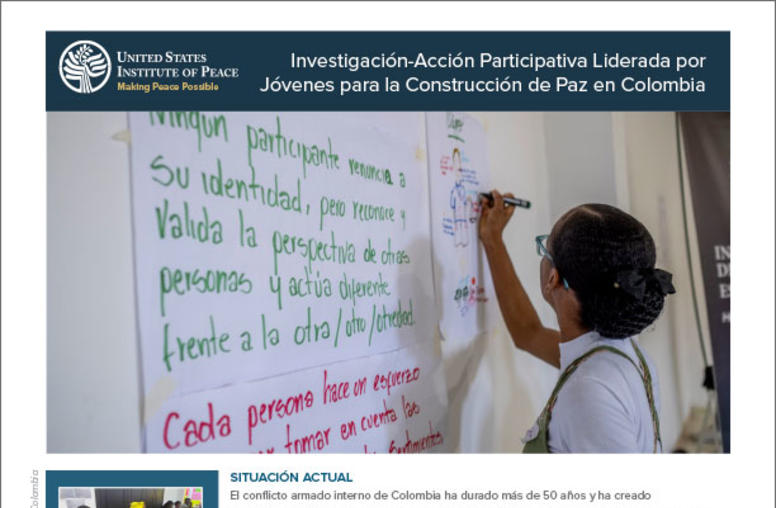Peacemaking and Mediation in Colombia
The Colombian government has generally employed distinct processes to deal with the three major illegal armed groups operating in Colombia. It has pursued efforts to demobilize, disarm, and reintegrate the United Self-Defense Forces of Colombia (AUC) paramilitary combatants, for which it enacted a controversial Justice and Peace law. Notwithstanding serious flaws, this process has demobilized some 35,000 combatants and has already produced evidence leading to the discovery of more than 500 mass graves linked to the demobilized paramilitary forces.
In late 2005, a civil society commission created the House of Peace (Casa de Paz) to facilitate a consultation process between Colombian civil society and the ELN guerillas which resulted in the current discussions in Havana, Cuba between the ELN and the Colombian government. These talks are beginning to bear fruit.
Finally, while the Colombian government’s strategy toward the FARC continues to be primarily military, there are increasing pressures to negotiate a humanitarian exchange of prisoners and hostages held by the FARC as both an end in itself and as a confidence building measure toward future talks. Third party actors—particularly the Europeans and the church—have been key in all three processes.
- What is the status of current talks in Havana between the ELN guerrillas and the government of Colombia?
- How is the Justice and Peace law and the demobilization of the paramilitary AUC shaping the possibilities for future peace accords?
- What has the role of the international community been with regard to each of these processes and what might it be?
- What lessons might be drawn from the experiences of the church and civil society with peace processes in Colombia?
Agenda and Speakers
10:00 AM - 10:15 AM - Welcome
- Richard Solomon
President, U.S. Institute of Peace - Virginia M. Bouvier, Introductory Remarks and Moderator
Senior Program Officer, Jennings Randolph Fellowship Program for International Peace, U.S. Institute of Peace
10:15 AM - 12:30 PM - National Peace Initiatives in Colombia
The ELN Peace Process
- Leon Valencia
Political Analyst and President, Corporacion Nuevo Arco Iris
The Humanitarian Accord: Gateway to Negotiations with the FARC
- Angela Giraldo
Peace Commissioner, Cali; and sister of Francisco Giraldo, Valle del Cauca departmental legislator kidnapped by the FARC in 2002
Challenges for the Judiciary in the Paramilitary Process
- Alberto Lara
Consultant, UNDP Justice Program
12:30 PM - 1:00 PM - Lunch
1:00 PM - 3:30 PM - Opportunities and Challenges for Third-Party Mediation
- David Smock, Moderator
Vice President, Center for Mediation and Conflict Resolution, Associate Vice President, Religion and Peacemaking Program, U.S. Institute of Peace
The Role of the International Community in Current ELN/FARC Processes
- Rémy Friedmann
Head of the Colombia Peace Policy Programme at the Swiss Federal Department of Foreign Affairs (Berne)
The Role of Internationals in Promoting Dialogue for Peace
- Jennifer Schirmer
Senior Fellow, U.S. Institute of Peace
The Role of the Churches and Civil Society in Colombian Peace Processes
- Adam Isacson
Center for International Policy
3:30 PM - 4:00 PM Conclusions
- Virginia M. Bouvier, Moderator
Senior Program Officer, Jennings Randolph Fellowship Program for International Peace, U.S. Institute of Peace


